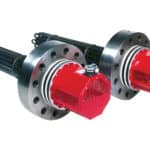Two entrepreneurs had just leased a large, empty factory building to manufacture candles and other items. It was a cold November afternoon in Toledo, Ohio. Stepping inside, they could visibly see their breath. The business partners pondered which type of commercial electric heaters they would need to keep the building warm, melt the wax in the vats, and other process heaters they might require.
We will help answer these questions by covering the different industrial electric heaters and their benefits. This information will help you determine which heater is most suitable for your purpose.
What Is An Industrial Electric Heater, and What Are Its Uses
An industrial electric heater is a device that generates heat for large spaces like warehouses, high heat for ovens and kilns, or immersion heaters for liquids in tanks.
There are three fundamental methods of heat transfer for industrial heaters:
- Conduction: Conduction transfers thermal energy directly from one molecule to another through vibration at higher frequencies. Conduction heaters disperse heat quickly and evenly. Some can reach high temperatures for soldering, heat treating, and curing. There are custom solutions for lower-temperature heaters to heat specific surfaces, such as a drum heater.
- Convection: Convection heaters heat the surrounding air next to the heating element. The heated air expands, rises, and forces colder air down toward the heater, creating circulation or macroscopic movement of air. They can efficiently heat a smaller office or workspace to the desired temperature, saving energy and reducing operating costs. One special type of convection heater is the hazardous location electric heater. It can be used in dangerous locations, preventing fires or explosions.
- Radiation: Radiant heat, or thermal radiation, transfers heat by photons, like when you stand under the hot sun. Industrial radiant tube heaters can reach temperatures of 1600°F (871°C). Another form uses electrical heating cables under floors or inside walls and ceilings, transforming them into radiating units.
Industrial electric heaters come in various types and sizes, which we delve into next.
The Different Types of Electric Industrial Heaters
There are three main types of electric process heaters: tubular, strip, and radiant.
Tubular Heaters
Tubular heaters are the most common type of industrial electric heater. They use a quartz-tungsten filament to create heat and are best for applications requiring a large amount of heat quickly.
A subset of this type is immersion heaters. They are systems for heating liquids in large quantities.
The three primary types of immersion heaters are:
- Flanged Immersion Heaters – Horizontal heating elements get welded to a flange that mounts onto a vessel’s side. Flange heaters can generate temperatures up to 1200°F (649°C).
- Screw Plug Immersion Heaters – Screw plug immersion heaters are a smaller version of flanged heaters. They range from 1/2” to 2-1/2” in diameter and also mount through the tank’s wall.
- Over-The-Side Immersion Heaters – These heaters install from the top into the container, such as a trough or IBC tote.
Immersion heating is 100% efficient, meaning all the electrical power converts to heat. To learn more, read How Do Immersion Heaters Work?
Another type, the finned tubular heater, adds fins to a heating coil. The increased surface area improves the heat exchanger and runs at lower surface temperatures for the same watts as regular tubular heaters. Applications include dryers, recirculation ovens, industrial electric fan-forced heaters, heat treating, and annealing.
Strip Heaters
Strip heaters use a Nichrome or Kanthal wire heating element enclosed in an insulated form that focuses the heat along a narrow strip directly over the element. It heats a thin section of material, such as acrylic, to soften and bend it into shapes.
Some strip heaters clamp directly onto objects to apply localized heat.
Radiant or Ceramic Infrared Heaters
Radiant heaters use infrared waves for precise heating applications.
Ceramic infrared heaters offer constant low-level heat, including food dehydration, sanitary packaging, plaster or plastic mold preheating, and heating. The ceramic insulators come in various configurations for dispersing or focusing the heat for localized heating purposes.
How to Choose the Right Industrial Electric Heater
Here are four tips to help you choose the right industrial electric heater:
- Determine what kind of heating power you need. Different models have different wattages and BTUs, so you’ll need to know how much power is required to heat your space effectively.
- Know the heater’s environment. Different heaters handle various indoor and outdoor conditions, so get one suitable for your specific location.
- Consider the area’s size. Get a heater with an adequate output sufficient for the space or volume if it’s an immersion heater for liquid.
- Consider the safety features. Industrial electric heaters should be equipped with automatic shutoff and overheat protection. It’s also important to look for a heater certified to the latest safety standards.
Keep these suggestions in mind to help you find a suitable electric heater for your process.
Maintenance Tips for Industrial Electric Heaters
Use these maintenance recommendations to extend the lifespan of your industrial electric heater.
- Ensure the heater is properly grounded. Grounding safeguards anyone close to the unit and helps extend the heater’s life.
- Clean the heater regularly. A cleaning schedule reduces buildup on the heating element, which can reduce its efficiency and create a fire hazard or failure.
- Clean or replace filters. Always inspect and clean filters associated with the heater regularly. Blocked filters contribute to heater failure and fires.
Following these maintenance recommendations will help extend your industrial electric heater’s lifespan.
Common Problems with Industrial Electric Heaters and How to Solve Them
Here is a chart to help you quickly troubleshoot electrical heater problems.
| Problem | What to Troubleshoot |
| Overheating | The setting is too high
Inadequate airflow from blockage or dirty filter |
| Short Cycling | Inadequate system power supply
Thermostat or control issue |
| Insufficient Heating | Blockage due to a dirty filter
Build up on the heating element Heater too small for the application |
| No Heat | Short circuit Broken heating elementProblems with the main circuit, such as a tripped breaker |
If you need help troubleshooting an industrial heater, contact our engineers at Powerblanket.
FAQs About Industrial Electric Heaters
Here are the most common questions people ask us about industrial electric heaters.
When should you use a fan-forced heater versus a convection heater?
Commercial fan heaters are a great choice when you need to heat a space quickly. These heaters have a fan that blows the heated air out of the unit, allowing it to spread quickly and evenly throughout the area.
A convection heater is suitable for larger spaces or tanks requiring steady, consistent temperature control. They are ideal for tank heating blankets, industrial facilities, ships, crane cabins, wind farms, and IBC tote heaters.
What is the most powerful electric heater you can buy?
If you need high-output system performance, there are a variety of powerful heaters on the market, depending on your needs. The highest-powered models can reach up to 100,000 BTUs per hour.
What is the most economical method to heat a workshop?
Industrial electric shop heaters that produce radiant heat are more economical than convection heat. The heat energy travels through the air without heating the air or using an electric fan motor. They are an excellent option for workshops that require spot heating, as they focus their heat in one area.
Save Energy and Reduce Operation Costs
An industrial electric heater is a versatile, cost-effective system for heating spaces and industrial processes. Every industry uses electrical heaters for one application or another.
At Powerblanket, our engineers can help you select the most efficient process heating equipment solutions for your industry.
Frequently Asked Questions
What is the most efficient industrial heating?
Infrared heating is considered the most energy-efficient method for industrial applications, as it provides direct heat to objects and surfaces without warming the surrounding air, making it ideal for large spaces like warehouses and factories.
What electric heater gives off the most heat?
Radiant heaters, particularly those using infrared technology, are known for emitting a significant amount of heat efficiently, making them suitable for industrial settings requiring high heat output.
Does OSHA prohibit space heaters?
OSHA does not outright prohibit space heaters, but they must comply with electrical safety standards and be approved by management for use in the workplace to ensure safety and compliance with regulations.
What size room will a 1500W space heater heat?
A 1,500-watt space heater is typically sufficient to heat a room of approximately 250 square feet, assuming there is some form of central heating already in place.
We make industrial process heaters that are top of the line in quality, efficiency, and safety.



